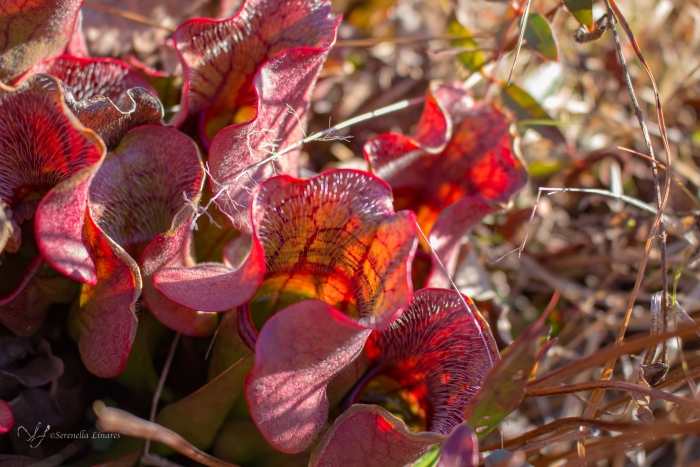Purple Pitcherplant
(Sarracenia purpurea)
Purple Pitcherplant (Sarracenia purpurea)
/
/

Serenella Linares
CC BY 4.0
Image By:
Serenella Linares
Recorded By:
Copyright:
CC BY 4.0
Copyright Notice:
Photo by: Serenella Linares | License Type: CC BY 4.0 | License URL: http://creativecommons.org/licenses/by/4.0/ | Rights Holder: Serenella Linares | Publisher: iNaturalist | Date Created: 2019-01-10T14:04:15-08:00 |























































Estimated Native Range
Summary
Sarracenia purpurea, commonly known as Purple Pitcherplant, is an evergreen perennial herb native to the North American Atlantic and Gulf Coasts, specifically in sphagnum bogs, pocosins, and wetlands. It typically grows to a height of 0.8-1 feet and a width of 1-2 feet. The Purple Pitcherplant is notable for its modified leaves that form a deep cavity, or pitcher, which traps and digests insects, aiding in its nutrition in the nutrient-poor soils of its native habitat. The pitchers are green with purple veining and a reddish tinge in the fall. It blooms in the spring, producing flowers that range in color from yellow to red, which are held high above the pitchers on separate stalks and are quite showy.
The Purple Pitcherplant is valued for its unique appearance and insect-trapping ability, making it a fascinating addition to water gardens, bog gardens, and as a container plant for enthusiasts of carnivorous plants. It requires consistently moist to wet soil conditions and can tolerate partial sunlight, though it thrives in full sun. It is relatively low maintenance but must be kept in acidic, nutrient-poor soil to mimic its natural bog habitat. While it is hardy, it is sensitive to mineral-rich water and fertilizers, which can harm the plant. It is not known for serious disease or pest issues, but root rot can occur if drainage is inadequate. This species is not typically invasive but should be monitored to ensure it does not escape cultivation in non-native areas.CC BY-SA 4.0
The Purple Pitcherplant is valued for its unique appearance and insect-trapping ability, making it a fascinating addition to water gardens, bog gardens, and as a container plant for enthusiasts of carnivorous plants. It requires consistently moist to wet soil conditions and can tolerate partial sunlight, though it thrives in full sun. It is relatively low maintenance but must be kept in acidic, nutrient-poor soil to mimic its natural bog habitat. While it is hardy, it is sensitive to mineral-rich water and fertilizers, which can harm the plant. It is not known for serious disease or pest issues, but root rot can occur if drainage is inadequate. This species is not typically invasive but should be monitored to ensure it does not escape cultivation in non-native areas.CC BY-SA 4.0
Plant Description
- Plant Type: Herb
- Height: 0.8-1 feet
- Width: 1-2 feet
- Growth Rate: Moderate
- Flower Color: Purple
- Flowering Season: Spring
- Leaf Retention: Evergreen
Growth Requirements
- Sun: Full Sun, Part Shade
- Water: High
- Drainage: Slow, Standing
Common Uses
Bird Garden, Fragrant, Water Garden
Natural Habitat
Native to sphagnum bogs, pocosins, and wetlands of the North American Atlantic and Gulf Coasts
Other Names
Common Names: Northern Pitcher Plant, Turtle Socks, Side-Saddle Flower, Frog’s-Britches, Huntsman’s-Horns, Pitcherplant, Sidesaddle-Flower, Common Pitcherplant, Huntsman’s-Cup, Sweet Pitcherplant
Scientific Names: , Sarracenia purpurea, Sarazina grandiflora, Sarracenia aurea, Sarracenia grandiflora, Sarracenia purpurea f. incisa, Sarracenia purpurea f. klawei, Sarracenia purpurea f. plena, Sarracenia purpurea f. purpurea, Sarracenia purpurea var. gibbosa
GBIF Accepted Name: Sarracenia purpurea L.